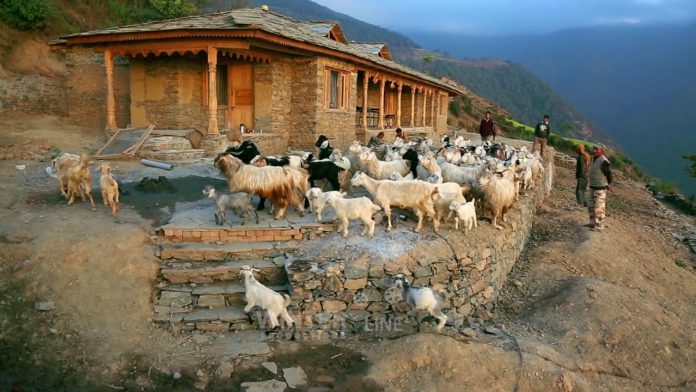
Green People – The most successful reverse-migration in Uttarakhand
Date:

Share post:
India measures 3,214 km (1,997 miles) from north to south and 2,933 km (1,822 miles) from east to west, and yet the maximum population is concentrated in few major cities. The lack of infrastructure and development in rural India has caused a rural-urban divide forcing people to leave their villages for better opportunities in mega-cities. Green People by Roopesh Rai is changing the landscape of Uttarakhand with reverse migration and sustainable tourism.
Uttarakhand in India is called Devabhumi (the Land of the Gods). It derives its name from the numerous Hindu temples and pilgrimage centers found throughout the state. People on pilgrims and trek enjoy the beauty of this Himalayan state. However, with only pilgrims and trekkers as the sole source of revenue, it was not easy to sustain a living in the hills. Further, the 2013 Kedarnath cloudburst tragedy shook the mountains and the people to their very core. At that time, residents of 2300+ remote villages situated in Uttarakhand abandoned their homes.
The Idea
A community of like-minded persons came together on 1st January 2015 to devise a plan to tackle and solve the severe issue of migration faced by Uttarakhand. They belonged to diverse professions like marketing, hospitality, and agriculture but had one sole purpose in mind – reverse migration. The aim was to revive the otherwise redundant old farming techniques to stay connected to one’s roots.
In 2016, Roopesh Rai founded Green People in the Garwhal district of Uttarakhand, a sub-range of the Himalayas.
The Green People
Roopesh Rai
Roopesh Rai is an alumnus of Sainik School, Lucknow, IHM Bhopal, and SP Jain Mumbai. He has worked with the Taj Group of hotels and Thomas Cook in senior sales and marketing roles. In 2013, when Roopesh visited Uttarakhand as a trade-observer to the disaster-stricken site of Kedarnath, the loss of lives and damage affected him badly. He decided to quit his job in the city to help people in this region.
Col. Ajay Kothiyal
Col. Ajay Kothiyal, a local army officer, was already working for Kedarnath restoration when Roopesh bumped into him. They both realized tourism was not the only solution to restore Uttarakhand’s glory. People had exchanged their roots and oldest professions to make lodges and hotels and drive tourist cars. It was time to make them find a way back.
Mani
Mani was a radio jockey and employed with The Times of India, Delhi. During his sabbatical, he even visited Nag Tibba, a peak in Uttarakhand. He first met Roopesh in Nag Tiba, who encouraged him to come onboard and co-found the Bakri Chhap vertical.
P.K Singh
The Sociopreneur in Uttarakhand is also the Vice President of Green People. He has contributed towards rural employment, rural produce marketing, and various segments of agriculture and enhancements of village livelihood.
Some of the others who contribute to Green People are Jagmohinder Singh, Bandana Rai, Mukesh Gaba, and Gorki Chandola.
The Initiatives – Bakri Chhap and Goat Villages

Bakri Chhap
Bakri Chhap is an initiative of Green People that helps create an FMCG brand for the marginalized farmers in Himalayan villages by providing them a source of livelihood. The farmers learn to follow environmental-friendly methods and sustainable farming. Bakri Chhap helps farmers earn a higher income by eliminating middlemen and selling their produce directly to luxury hotels, retail chains, and Goat Villages.
Today these farmers sell their farm produce to customers like Taj, JW Marriott, Crowne Plaza, Jaypee, Tata STAR Bazaar, and Amazon India.
“We work with nearly 120 farmers directly and over 500 farmers indirectly in over 35 villages. The portfolio comprises almost extinct indigenous varieties of cereals, pulses, honey, and millets, predominately coming from mid-Himalayan altitudes. Due to this newly found market linkage, the villagers are shifting from mono-cropping to diversified and traditional/ indigenous crops and horticulture, which are conducive to the landscape and the region’s microclimate and biodiversity, and require the least intervention with irrigation,” says Mani.

Goat Villages
The Goat Villages started in 2015 at Nag Tibba peak in Uttarakhand is a Green People initiative. The Goat Villages is a chain of farm retreats and homestays promoting sustainable rural tourism. The hotels source local food for the guests and use solar energy for lighting and hot water. A tourist can learn about goat farming and living a sustainable and environment-friendly life during a farm stay or homestay.
Concepts like Pay What You Like, Be My Volunteer Village Manager, and Bakri Swayamvar (marriage of goats) have helped Green People to bring back the migrants to Uttarakhand.
Today, Green People have also set up Goat Village homestays in Dayara Bugyal, Kanatal, Pangot, Bastadi, Kumali, Thati Dhanari, and Urgam Valley of Uttarakhand.
“Instead of creating a plain tourism entity or a uni-dimensional FMCG entity, we focused on creating an integrated rural development model focusing on holistic development of villages. Our integrated rural development focuses on skill-development of village youth across Uttarakhand,” says Roopesh.
Awards
Green People is India’s first of its kind, integrated, multiple international award-winning impact organization working towards rehabilitating abandoned villages & reverse-migration of marginalized farmers.
In just three years, the organization has influenced more than 70 times increase in footfall (from 1200 to 84,000+ persons per year) in the sub-Himalayan area of Nag Tibba. Their social engineering and innovative destination marketing methods helped revive the local culture and agriculture, drawing people back to their abandoned homes.
In 2019, the organization won: –
- Gold at WTM London, and
- Gold at Indian Responsible Tourism Awards (IRTA)
Green People was also shortlisted by WhatsApp International, in impact business organizations in the travel and tourism space.
Conclusion
This reverse migration model has inspired thousands living in the rural areas of Uttarakhand to return home. It is time for Green People to spread their wings to other villages in India, as better development can only happen when there is a balance in rural-urban India.
